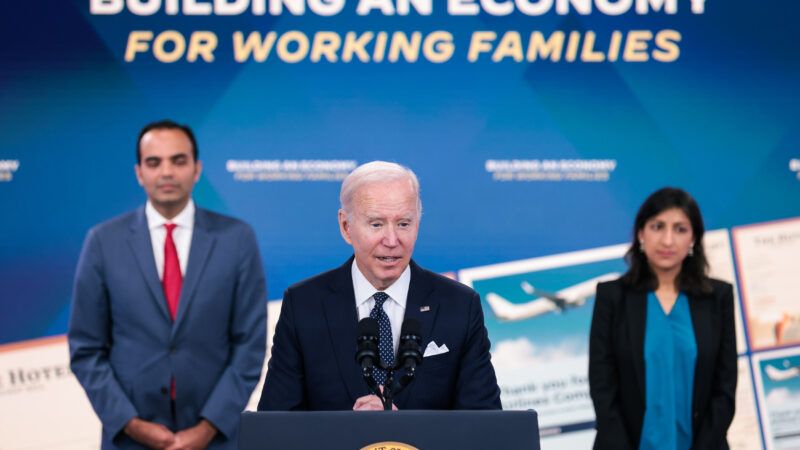Did Inflation Save Us From 'New Progressive Economics'?
Anti-market progressives dominate the Biden administration. Their policies also help discredit it.

The Biden era's high inflation has been terrible for the economy and the country generally. But did it save us from a more permanent progressive takeover of federal government policy?
That's the tantalizing question hanging over a recent piece published by Vox Senior Politics Correspondent Andrew Prokop that chronicles the rise, and pending fall, of "New Progressive Economics."
President Joe Biden obviously was not the left's preferred candidate in the 2020 Democratic primary.
But, as Prokop tells it, he staffed his administration with lots of ultra-progressive wonks and political operatives who wanted to overthrow the Democratic Party's perceived "neoliberal" consensus on trade and regulation in favor of aggressive anti-trust enforcement, proactive industrial policy, protectionism, and a massive increase in social spending.
They basically got most of what they wanted, starting with the $1.9 trillion American Rescue Plan (ARP)—a law pitched as a pandemic recovery bill that was stuffed full of progressive spending items.
Now, however, depression is setting among the New Progressives. There's a good chance that no matter what happens in November, they'll see their influence and policy legacy crumble.
That's obviously true if former President Donald Trump wins and Republicans get a shot at staffing the executive branch.
But Vice President Kamala Harris also appears a lot less enamored with "post-neoliberal" ideas than her boss. Her campaign trail overtures to big business, friendly relations with select billionaires, and a general instinct to run away from every progressive position she's ever taken (save on abortion) all have them sweating.
Should she get elected, the New Progressive agenda might still be a dead letter.
If that's true, they have only themselves to blame.
Biden is historically unpopular. Voters give him extremely low marks for his handling of the economy, and they rank the economy as their number one issue. The president headed for defeat even before his disastrous debate with Trump.
Polling has consistently shown that voters are mad about decades-high inflation and the cost of living specifically. Prices went up under Biden, voters got mad, and they stayed mad.
Inflation didn't just happen on Biden's watch. His budget-busting American Rescue Plan—which dumped a bunch of monopoly money on an already recovering post-pandemic economy—predictably sent prices through the roof.
At the time, "neoliberal" economists who'd held prominent positions in previous Democratic administrations, but had been largely replaced by the New Progressive types Prokop profiles, publicly warned that the ARP was too big and would generate lots of inflation.
The New Progressives shrugged off these criticisms as reactionary snipping from careerists steaming over their loss of power and influence.
But neoliberals turned out to be right. Progressive dismissals of their warnings ended up endangering their entire political project.
The silver lining to Biden-era inflation, for all the hurt it caused, is that it might end up discrediting the New Progressive's economic policies within the Democratic Party.
That's cause enough to celebrate. Before one points and laughs too hard, it's worth stressing that the New Progressive agenda might not be so self-correcting in the future.
One can imagine a different order of operations that would have been less self-defeating.
Had Biden listened to the inflation hawks on spending early in his term, while still giving Lina Khan carte blanche at the Federal Trade Commission (FTC) it's quite possible that he'd be cruising to a second term right now. The post-neoliberals would have another four years to entrench their more subtly economically ruinous agenda.
While high inflation makes voters mad about the status quo, it also leads them to endorse dangerous policies to counter it.
While Harris is not running as a progressive firebrand, she has been willing to endorse radical price and rent controls to deal specifically with the problem of rising prices. If she wins in November, it's possible she'll press for those policies—and we'll have inflation to thank for that too.
Rent Free is a weekly newsletter from Christian Britschgi on urbanism and the fight for less regulation, more housing, more property rights, and more freedom in America's cities.


Show Comments (31)